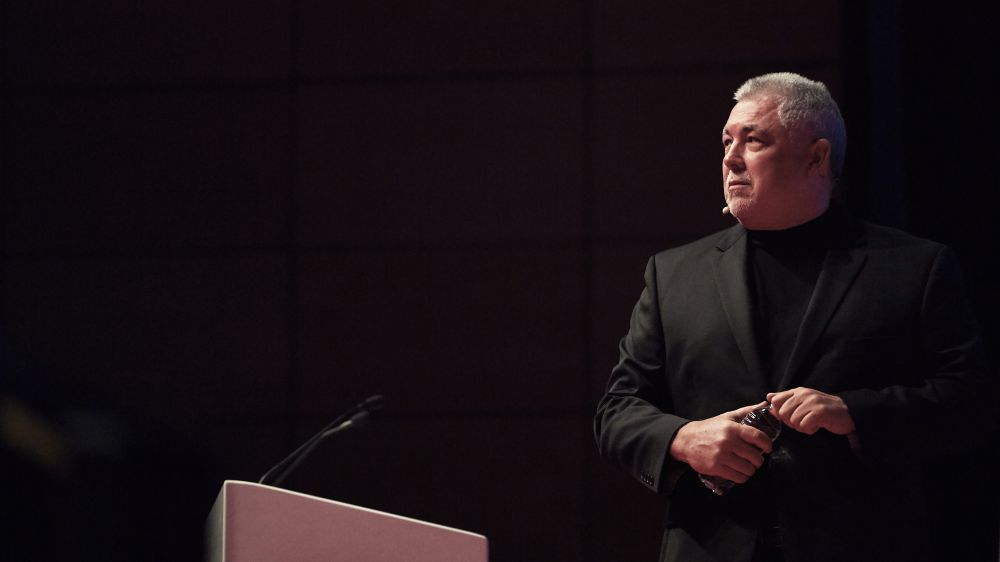Interview: Frank Coles, CEO of Transas

Frank Coles is the CEO of Transas, a world-leading provider of high tech equipment, software applications, integrated solutions and services for the maritime industry. Coles sat down with MarEx at CMA 2017 to talk about the next phase of the maritime industry’s evolution.
MarEx: The maritime industry has undergone a dynamic shift in recent years. What is the future of the industry?
Coles: The discussion about unmanned ships, smart operations and improved efficiency are really just code for the end of the current maritime model. The maritime industry is part of the “first mile” segment of the shipping business. Shipping is the business of end-to-end delivery of goods by whatever means, whether by road, in air or at sea. The maritime industry is about ships and ship operations. I anticipate several defining moments are on the horizon, not unlike the ones that impacted Kodak and Blackberry.
MarEx: Could it really be that dramatic?
Coles: There is no place in the maritime industry to say that we are traditional and that we are special from other transportation modes. Retailers like Alibaba, Amazon and Walmart are shaking up the shipping world, especially in the parcel delivery industry. These major e-commerce players are starting to disrupt the shipping space as they strive to have more control over last mile logistics and delivery. Until now the e-commerce players relied on FedEx and UPS.
Amazon is moving into the shipping business as it continues to sign leases for aircrafts and begins to compete with FedEx and UPS. Amazon is also interested in acquiring an airport in Germany. Meanwhile, Walmart is also beginning to take control of its own shipping – even on ships. Alibaba has recently signed contracts with Maersk, CMA CGM and ZIM Lines. So, clearly the lines between the logistics, e-commerce companies and the shipper are being blurred.
MarEx: Will the e-commerce sector really impact waterborne transportation in the very near future?
Coles: The natural progression would be for global shippers to begin leasing their own assets in the maritime industry, which will challenge the traditional maritime business model. If they are beginning to lease their own planes, own airports and manage their own logistics, then why not ships, ports and port operations? It is easy to imagine electronic cargo booking and digital port operations, with e-commerce giants owning ships, owning ports or sections of them and controlling the complete logistics chain.
MarEx: In our lifetime?
Coles: I think you will see unmanned ships in our lifetime, but I also see more efficiencies and smart operations during our lifetime. The efficiency of the maritime industry is the last piece to be addressed in the e-commerce model and the digitalization of the shipping goods.
The effects of digitalization are already beginning to be felt in the maritime ecosystem. I think it is the changing model of shipping cargoes and logistics that will change ship owning and operations model, which will create the smart maritime operations and scale more efficiencies within the industry. Remember, Hilton did not create AirBnB, nor did the taxi companies invent or support Uber.
MarEx: Will digitalization alter mariner duties in the future?
Coles: Yes, defining a seafarers’ job in the future is going to change due to digitalization of vessels. For instance, Transas provides bridge equipment, software and VTS equipment, shipowner and port operations software and simulation training systems, but what we don’t provide is the ecosystem that connects them all together.
Look at the aviation industry. Pilots are essentially system engineers because planes essentially fly themselves and air traffic control monitors the flight patterns and all air traffic. There is no doubt in my mind that is where the maritime industry is heading.
MarEx: So a globally automatized system with fleet management centers is in the industry’s future?
Coles: Ship traffic control centers and e-Navigation will become critical to efficient and safety of waterborne vessels. Whether the vessels are manned ships, autonomous or smart ships with smart operations, the industry will become digitalized with onshore decision support and monitoring and fleet management centers. In fact, it is already being done by companies like Maersk, CMA CGM, Hapag Lloyd and Carnival Corporation.
MarEx: Will digitalization fix human error and make shipping accident free?
Coles: That is a good question because it’s about de-skilling people and as technology becomes so advanced you have to empower people to fix the problems. It is irrational to think automation and technology will remove all of the problems. So it is still about people having the right skills and the right training to fix the issues in the modern shipping industry.
The industry will have to face the challenges of the digital environment and the role of the middle man will become redundant, which will eliminate many of the inefficiencies that have traditionally cushioned the industry as the new digitized model takes shape.
MarEx: What role has Transas taken to modernize the industry?
Coles: At Transas, we have created THESIS, which is the Transas Harmonized Ecosystem of Integrated Solutions. THESIS is a platform with shared data services, decision support tools and applications to enable the digital maritime industry to operate. In this respect, we see the navigation sensors along with ECDIS as the brain employed both to operate and to monitor the ships operations.
We also have to consider the human dimension of the crew onboard and those working ashore. The maritime academies will play a critical role in providing training, competence and support for human factor requirements. Transas will be about more than supplying ECDIS, our future will be supplying decision support infrastructure tools to enable smart operations. Smart operations is the result, not the reason. -MarEx
The opinions expressed herein are the author's and not necessarily those of The Maritime Executive.
